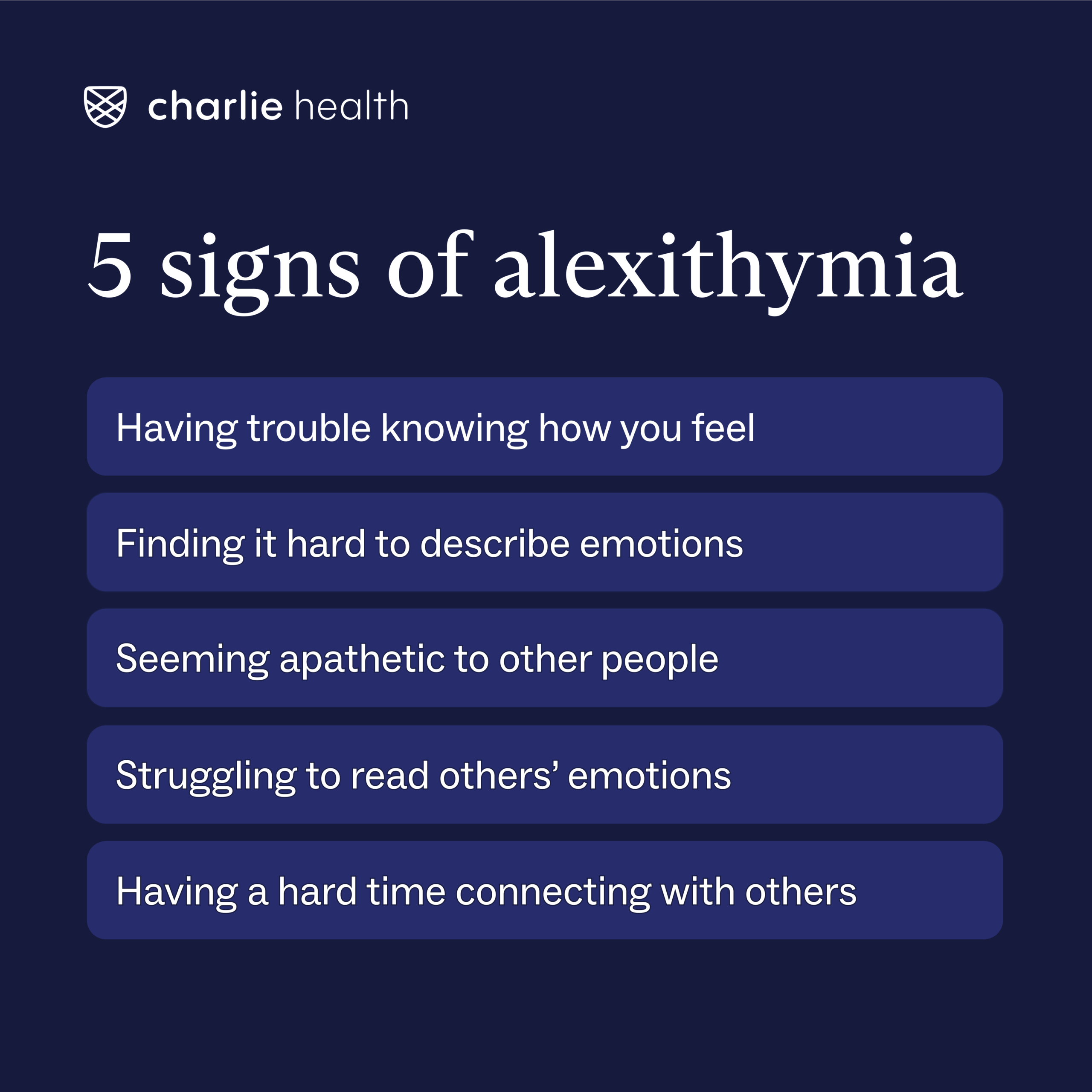
Table of Contents
What Is Alexithymia?
Written By: Charlie Health Editorial Team

Clinically Reviewed By: Dr. Don Gasparini
Updated: May 14, 2024
5 min.
It's normal to sometimes struggle to articulate how you're feeling, but if it’s beginning to interfere with your mental health or relationships, you may be dealing with alexithymia.
Learn more about our Clinical Review Process
Table of Contents
It’s normal to struggle to articulate your feelings every now and then — maybe you feel overwhelmed at a certain moment or have a limited emotional vocabulary when discussing a certain sensitive topic. But if these moments are pervasive and persistent, it may be alexithymia — a brain function marked by difficulty identifying, describing, or understanding one’s own emotions.
Below, we dig into this personality trait, including what causes alexithymia, how to navigate it in relationships, and different kinds of treatment that can support emotional expression.

We can help you understand your emotions
Neurodivergent-affirming and trauma-informed intensive therapy.
What is alexithymia?
The term “alexithymia” was coined by Peter Sifneos, a psychotherapist, in the 1970s. It derives from the Greek words “a-” (meaning “without”), “lexis” (meaning “words”), and “thymos” (meaning “emotions” or “feelings”). Essentially, it signifies difficulty in finding words to describe one’s emotions and struggling with emotional intelligence.
A person with alexithymia may have difficulty distinguishing between different emotional states, expressing their emotions, and recognizing emotional cues in others. They might prefer talking about facts instead of delving into their emotions and be described as having a deficit in emotional awareness or emotional literacy. Without a clear understanding of their emotions, people with alexithymia may also have difficulty with emotional regulation.
Alexithymia is not classified as a mental disorder in the Diagnostic and Statistical Manual of Mental Disorders (DSM-5). However, it is often associated with various mental health conditions and developmental disorders (more on this below).

Alexithymia and interoception
Interoception refers to the ability to perceive and understand internal bodily sensations, such as hunger, thirst, heartbeat, and emotions. There is a close relationship between alexithymia and interoception, as both involve awareness and processing of internal states — the former pertaining to emotions, and the latter to physical sensations.
Research shows that people with alexithymia often have difficulties with interoception. They may struggle to accurately perceive and interpret their bodily sensations and emotions. This impaired interoceptive awareness of physical sensations can contribute to the characteristic challenges in identifying and expressing emotions seen in alexithymia.
What is the cause of alexithymia?
The exact cause of alexithymia isn’t fully understood, but it’s believed to involve a combination of genetic, neurological, and environmental factors. Some research suggests that alexithymia may be related to differences in brain structure and function, particularly in areas involved in processing emotions. Additionally, early life experiences, such as trauma or neglect, may make emotional processing more challenging and contribute to the development of alexithymia, research shows. However, more research is needed to fully understand the underlying causes of this personality trait.

Who is most likely to have alexithymia?
Alexithymia can occur in people of any age, gender, or background, but certain factors may increase the likelihood of developing it. Some research suggests that men may be more likely to experience alexithymia than women.
Also, as mentioned, people with certain developmental or psychiatric conditions, such as autism spectrum disorder, post-traumatic stress disorder (PTSD), or depression, may have a higher prevalence of alexithymia. Up to about half of people with autism spectrum disorder may have alexithymia, studies show. However, alexithymia can happen in neurotypical people and those without a mental health condition, and having one of those conditions doesn’t automatically mean that a person will develop alexithymia.
Tips for navigating alexithymia in relationships
Alexithymia can pose significant challenges in maintaining relationships due to the difficulties people face in recognizing, understanding, and expressing emotions. However, it is possible for people with alexithymia to have healthy and fulfilling relationships. While it may require some additional effort and understanding, here are some strategies that can help if a loved one has alexithymia.
Practice open communication
Encourage open and honest communication in the relationship. Discuss how alexithymia affects both people and explore ways to support each other. Finding alternative ways to express emotions, such as through writing, can also be helpful.
Validate emotions
Validate your loved one’s emotions, even if they struggle to express them verbally. Let them know that their feelings are important and that you’re there to support them. One way to do this is by paying attention to nonverbal cues, such as body language and facial expressions, to better understand your partner’s emotions. Nonverbal communication can often convey more than words alone.
Encourage self-reflection and professional help
Encourage your loved one to engage in self-reflection and introspection to better understand their own emotions. Journaling or therapy can be helpful tools for this. A therapist can provide guidance, support, and tools for navigating alexithymia in the relationship.
How is alexithymia treated?
Treating alexithymia typically involves a combination of therapeutic approaches aimed at improving emotional awareness and expression. Here are some common treatment options:
Psychotherapy
Psychotherapy, particularly approaches that focus on emotions and interpersonal dynamics, can be beneficial for individuals with alexithymia. Therapies such as cognitive-behavioral therapy (CBT) and psychodynamic therapy are often used to help people with alexithymia explore and understand their emotions. Therapists may use techniques such as emotion-focused therapy to help clients identify and express their feelings more effectively.
Emotion regulation skills training
This involves teaching people specific techniques and strategies for recognizing and managing emotions. Emotion regulation skills training may include mindfulness practices, relaxation techniques, and cognitive restructuring exercises.
Support groups
Participating in support groups or group sessions with others who have alexithymia can provide validation, encouragement, and a sense of community.Sharing experiences, emotions, and coping strategies with others can be helpful in managing alexithymia.
Medication
While there are no medications specifically approved for treating alexithymia, certain medications may be prescribed to address co-occurring conditions such as an anxiety disorder or depression, which can sometimes exacerbate alexithymic traits. A qualified mental health professional can provide personalized guidance and support throughout the treatment process.

Treating alexithymia with Charlie Health
If you or a loved one is struggling with alexithymia, Charlie Health is here to help. Charlie Health’s virtual Intensive Outpatient Program (IOP) provides more than once-weekly mental health treatment for young people and families dealing with serious mental health conditions, including trauma. Our expert clinicians incorporate evidence-based therapies into individual counseling, family therapy, and group sessions. With this kind of holistic online therapy, managing your mental health is possible. Fill out the form below or give us a call to start healing today.




